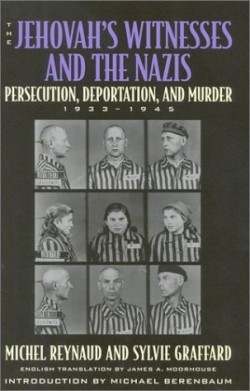The Jehovah's Witnesses and the Nazis
Persecution, Deportation, and Murder, 1933-1945
The words that fell from Hitler’s mouth in 1933 must have chilled the blood of any non-Aryan remaining in the Weimar Republic. He said, “If there are still those in Germany today who say: we will not submit, then I respond: you will disappear—and after you will come a youth that will know nothing else.” Refusal to submit by blood or by conscience was no matter to him: those not willing or able to conform were to be eliminated.
Jehovah’s Witnesses are not regularly included among the major groups of people persecuted by the Nazis before and during WWII, despite the large numbers who were detained and executed. The 5,000 who were sent to concentration camps were considered “voluntary prisoners,” for there was a difference between them and their fellow victims: they had the option to recant their religious views, pledge allegiance to Hitler, sign an affidavit to that effect, and go free. Reynaud, a French authority on the Holocaust, and Graffard, a student of deportation history, have exposed this painful story for the first time.
Witnesses were actively pursued in their communities by the local officers of the Nazi Party, sometimes simply because they refused to vote in Reichstag elections. To Witness Max Schubert, it was contrary to his faith to vote for anyone but God. Two officers dragged him and his wife to the voting booths five times, but could not force them to vote. Instead, the officers made Schubert sit outside the polls wearing a sign declaring himself a traitor. The passing children of his town called for him to be taken “to the concentration camp!”
Jehovah’s Witnesses in Germany and elsewhere in the world made a conscientious and peaceful effort to appeal to the Nazi aggressors on behalf of their spiritual brethren. Even their most threatening telegrams, which informed the Party that they would be destroyed by God for their evil acts, was no match for brute force. Despite the torture endured (one man was forced to lick up his own blood after being beaten for refusal to salute), Witnesses rarely wavered from their religious conviction. Strangely, it was for this dedication that they were greatly admired by their strongest persecutor, Chief of the SS, Heinrich Himmler.
Personal stories of individual suffering and triumph help Reynaud and Graffard to make this vital chapter of Holocaust history breathe.
Reviewed by
Kristin Putchinksi
Disclosure: This article is not an endorsement, but a review. The publisher of this book provided free copies of the book to have their book reviewed by a professional reviewer. No fee was paid by the publisher for this review. Foreword Reviews only recommends books that we love. Foreword Magazine, Inc. is disclosing this in accordance with the Federal Trade Commission’s 16 CFR, Part 255.

